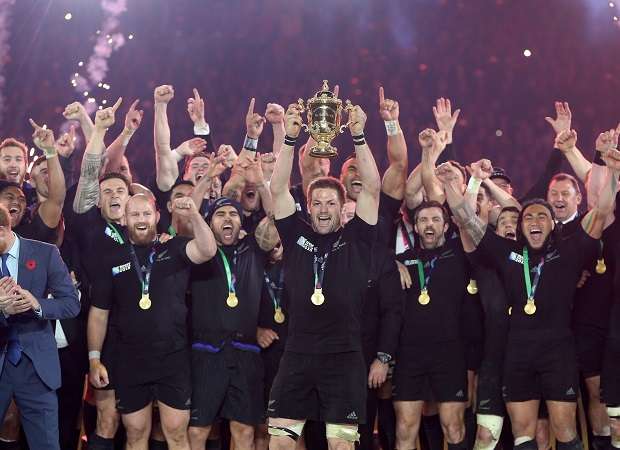
 The All Black procession is in full marching order again, with the usual array of tub-thumpers and cheerleaders proclaiming them as the undisputed masters of the rugby universe. My hunch is that if England played New Zealand this autumn there would be a serious dispute.
The All Black procession is in full marching order again, with the usual array of tub-thumpers and cheerleaders proclaiming them as the undisputed masters of the rugby universe. My hunch is that if England played New Zealand this autumn there would be a serious dispute.
This is mainly because Australia and Wales, the two teams who have allowed New Zealand their five post 2015 World Cup wins, have been poor in defence and devoid of conviction – with the Wallabies nothing short of dire in their opening round rout in the Rugby Championship.
New Zealand winning at Twickenham with the same ease they did against Australia in Sydney a fortnight ago would be totally at odds with the current form book in international rugby. The pity is that England, who appear to be the only team in either hemisphere who are currently capable of putting a dent in the world champions, are not scheduled to play them for another 15 months.
England’s advance to second in the world rankings on Eddie Jones‘ watch – which is not yet a year old – has established them as a credible threat to the All Blacks. Furthermore, in terms of relative gains, by any objective yardstick the progress made by England’s World Cup chokers has been more remarkable than that wrought by Steve Hansen in reigniting the All Blacks.
This is simply because when New Zealand were at the summit, with a solid succession plan in place, the England outfit Jones inherited was at ground zero. Ironically, Jones also did All Black coach Hansen a favour during a transitional period, because England’s 3-0 series win Down Under this summer left Australia in total disarray.
Some Aussie pundits labelled the supine 42-8 defeat in the Championship opener as one of the worst performances in Wallaby history. However, what they failed to highlight was that the way England out-thought, out-muscled and, ultimately outplayed Michael Cheika‘s team with their rope-a-dope tactics left Aussie confidence blowing in the wind.
The lack of self-belief appeared to be contagious with Wallaby head coach Cheika chopping and changing in selection like a hyperactive axeman. If his decision to disrupt the back row by dropping Scott Fardy for Ben McCalman bordered on the eccentric, the reversion to the European old guard of Matt Giteau, Will Genia and Adam Ashley-Cooper proved to be wishful thinking.
It made Australia easy meat for a far more coherent, urgent New Zealand outfit, and the attempted safety-first fix in Wellington a week later was too little too late. It ended in a predictable second win for New Zealand (29-9) and resulted in Hansen all but having his mitts on the title with only two rounds played.
 More importantly, it was a body blow for the competitive credentials of the Southern Hemisphere’s showpiece tournament. A register of how quickly the landscape can change in Test rugby was provided by a Wallaby team, which had taken the game to New Zealand with gusto in the World Cup final less than 12 months earlier, barely firing a shot in attack in the entire 80 minutes at the Cake-Tin.
More importantly, it was a body blow for the competitive credentials of the Southern Hemisphere’s showpiece tournament. A register of how quickly the landscape can change in Test rugby was provided by a Wallaby team, which had taken the game to New Zealand with gusto in the World Cup final less than 12 months earlier, barely firing a shot in attack in the entire 80 minutes at the Cake-Tin.
If the fixture schedule had dictated that New Zealand travel to Argentina in the next round to face a Pumas side pumped-up by their victory in Salta over South Africa, it’s just possible that their unchallenged supremacy would have stalled. The Pumas pack led by Agustin Creevy has a blend of power and athleticism capable of challenging the All Blacks in the set piece, and the loose, in a way that Australia failed to, while backs Nicolas Sanchez, Juan Martin Hernandez, Martin Landajo and Tomas Cubelli were inspirational against the Springboks.
Instead, with Argentina having to travel to Hamilton to face the world champions in their own backyard on Saturday, and South Africa having to do the same in Christchurch the following week, the prospect of an upset looks as distant as Jupiter.
For the moment, Jones is more interested in getting England’s mindset right to confront South Africa in the opening autumn international.
The relentless energy with which he has tackled the England coaching job does not seem to have diminished over the summer. This was apparent in an interview onTest Match Special while attending the fourth Test between England and Pakistan at the Oval.
He explained why he had been so insistent on wanting his England side to rediscover their traditional strengths. “One of the key things in any team is to find its identity. That’s why it was so important to do it the English way. If I’d come in and said we are going to be a side that plays coast-to-coast, sideline to sideline, they wouldn’t have been able to accept that.”
He says that now, with a good set-piece base and an abrasive pack of forwards, the old English template is back in place, and that this season he wants his squad to branch out into new areas.
“The exciting thing is that so far all we’ve worked on is the base, and now there are the layers to come – like the ability to score from different situations, and from long-distance tries.”
There is an English storm brewing, and it’s capable of raining on New Zealand’s parade.


Champions Cup
Bordeaux Begles accused of Henry Pollock vendetta

English Championship
Ryan Lamb support for Championship changes
Latest News
Great Britain to cut its sevens project

Latest News
Call for concussion protocols to be revised






















You must be logged in to post a comment Login